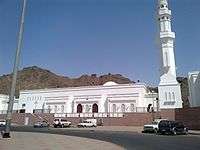Muhammad ibn al Uthaymeen
| Muhammad ibn al-Uthaymin | |
|---|---|
 | |
| Born |
March 9, 1925 Unaizah, Saudi Arabia |
| Died |
January 5, 2001 (aged 75) Unaizah, Saudi Arabia |
| Resting place | Mecca, Saudi Arabia |
| Nationality | Saudi Arabian |
| Ethnicity | Arab |
| Era | 20th century |
| Region | Arabian Peninsula |
| Religion | Islam |
| Denomination | Sunni |
| Jurisprudence | Hanbali |
| Creed | Athari |
| Movement | Salafi movement |
|
Influenced by
| |
| Awards | King Faisal International Prize for Service to Islam, February 8, 1994 |
| Website | www.ibnothaimeen.com |
Abu 'Abd Allah Muhammad ibn Saalih ibn Muhammad ibn al-Uthaymeen at-Tamimi (Arabic: أبو عبد الله محمد بن صالح بن محمد بن سليمان بن عبد الرحمن العثيمين التميمي) (March 9, 1925 – January 10, 2001) was a Sunni scholar of Saudi Arabia who was considered "a giant within conservative Salafi Islam".[1]
Birth.
Salafi movement |
|---|
 Sab'u Masajid, Saudi Arabia |
|
|
He was born in Ramadan 1347 H, in 'Unaizah - one of the cities of Al-Qasim - in the Kingdom of Saudi Arabia.
Influence
Al-Uthaymin is still considered an influential cleric within the Salafist movement. Due to his eclectic approach of quoting from all various schools of law within Sunni Islam, readers are faced with a seemingly monolithic edifice of Islamist scholarship; while some of his views are without precedent, they are still considered definitive by many Salafists today, especially those in Egypt.[2]
Controversial fatwas
A fatwa he issued was posted on the fatwa website IslamQA.info stated that Muslim women should not use pain-relieving medication during labour and delivery as it may be a plot against Muslims "because the more births take place in this manner, the more the skin of the abdomen is weakened and pregnancy becomes more dangerous for the woman, and she becomes unable to get pregnant."[3][4]
Uthaymeen also controversially supported the idea that the Green Dome of Madinah should be destroyed and the graves of the Islamic prophet Muhammad as well as his apostles Abu Bakr and Umar should be flattened.[5][6]
In another Fatwa, Uthaymeen claimed that someone who abandons the prayer leaves Islam and that it is therefore forbidden to remain with a husband or a wife who no longer prays.[7]
References
- ↑ Caryle Murphy (15 July 2010). "A Kingdom Divided". GlobalPost. Retrieved 6 May 2014.
First, there is the void created by the 1999 death of the elder Bin Baz and that of another senior scholar, Muhammad Salih al Uthaymin, two years later. Both were regarded as giants in conservative Salafi Islam and are still revered by its adherents. Since their passing, no one "has emerged with that degree of authority in the Saudi religious establishment," said David Dean Commins, history professor at Dickinson College and author of "The Wahhabi Mission and Saudi Arabia."
- ↑ Richard Gauvain, Salafi Ritual Purity: In the Presence of God, pg. 173. Part of the Islamic Studies series. London: Routledge, 2012. ISBN 9781136446931
- ↑ International Business Times: "Isis attempting to stop pregnant women having 'un-Islamic' C-section births" by Fiona Keating March 28, 2015
- ↑ "ISIS clamps down on women having 'un-Islamic' Caesarean births". Mail Online. Retrieved 2016-06-04.
- ↑ Krieger, Zvika. "McMecca: The Strange Alliance of Clerics and Businessmen in Saudi Arabia". The Atlantic. Retrieved 2016-06-04.
- ↑ "Medina: Saudis take a bulldozer to Islam's history". The Independent. 2012-10-26. Retrieved 2016-06-04.
- ↑ "Can a Muslim say happy Christmas to his friends?". The Independent. 2009-11-26. Retrieved 2016-06-13.
| Wikimedia Commons has media related to Muhammad ibn al Uthaymeen. |
External links
- Uthaymeen's Website (Arabic language)